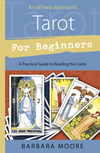Tarot: 5 Ways to Get Out of Your Comfort Zone

Why would anyone want to get out of their tarot comfort zone? If you are in your comfort zone, you are likely to be stable and confident and therefore able to do solid and dependable readings. Rituals and regular processes help ground readers and prepare the mind to begin the important work of interpreting the cards. We spend so much time finding our groove and learning to recognize and recreate our comfort zone; why would we want to step out of it?
As a student of the tarot, you know as well as I that if anything stays too long in the reliable realm of the "4" all the positive attributes of that sturdy number begin to turn negative. Stagnation and close-mindedness creep in. Wonder and curiosity are replaced with dismissal and the seeds of arrogance. Revelation turns to dogma.
A tarot rut will not only dull your tarot talents, it will also steal your enthusiasm and energy for the cards. So stop your practice from becoming nothing more than a deep rut maker by inviting in fresh energy that comes with stepping out of your comfort zone. It can be scary to do so…and the scarier it is to you, the more you probably can benefit from it.
- Read for people you wouldn't normally read for.
Professional readers make a point of defining their audience, the type of clients with which they most want to work and who can most benefit from the type of readings they offer. This approach to business and building an effective practice is a good one. However, reading for the same type of people with the same issues in the same way can lead to the reader doing rote work. It might lead to homogenized readings and stereotyping clients. Reading for other types of issues or people will help the reader to stay on their toes, to keep their listening skills fresh, and to see their cards in new ways
A professional reader would not want to offer less than professional services for paying clients, so I would suggest saving this activity for conferences where you can exchange readings for peers, for gatherings with friends, or with volunteers to understand that you will not be employing your usual professional methods.
For non-professional readers who read for themselves or for friends and family, challenge yourself when you can. Again, attending conferences or meet ups is a way to meet people with whom to exchange. Perhaps offering your services for a charity event or volunteering to read for your friends' parents or children (depending on the age of your friends) can bring new people to your table. - Read with a deck you'd never normally use.
We all have our favorite decks. They are familiar and comfortable, like a pair of jeans that fit perfectly. Even if we have several favorites, they likely have similarities, perhaps in artistic style or in theme. Many of us, especially in the US, like decks that follow the Rider-Waite-Smith tradition. Using familiar decks usually leads to great readings because we are confident enough about the individual card readings that we are freed up enough to focus on the overall interpretation and interplay of cards.
However, using the same deck or the same sort of deck can lead to dullness, a lack of really seeing the images. And let's face it, we use the cards with images on them because they allow the intuition to play along with the logical brain to create a more rounded divinatory experience. Using a new deck is a great way to remind yourself to really look at the images and appreciate the aspect that the visual feast brings to your readings. When you do this try not to just apply your normal meanings to the cards until you've carefully considered the images. - Get readings from other readers.
Getting readings from other readers is always a treat. Plus, it is a wonderful way to experience how other readers handle a reading. All readers are different, and even if you experience a reading style that you don't like, it is still valuable because it helps you learn and identify what you don't like.
Go into the reading with an open mind and with the intent to pay attention to the reading as a process, not just the reading itself. How is it the same as your process? How is it different? What new things does it inspire you to try? - Hang out with other readers.
Conferences, meet ups, workshops, online forums…these are all great ways to hang out with other readers. Talking and interacting with other readers can teach you a lot. Listen to (or read) what people are saying. Consider new ideas, old ideas you've already discarded as useless, or ideas different from yours carefully. Instead of jumping in with your opinion, ask questions with the intention of really learning more, trying to understand their perspective. You don't have to adopt it, but don't be so quick to argue your point or prove how smart you are (or how right you think you are). Taste ideas that you disagree with. Roll them around in your mouth. Sit with them a bit. Then comment. Invite others to question your ideas or opinions. Nothing bad will happen! Either you will learn more about your own thoughts or you will drop an idea that no longer works for you. - Read books
This can be hard for people who have been reading tarot for a long time. It is easy to assume that all tarot books, save a select and rare few, are the same. But even someone who has been practicing for forty years can learn something new even from a beginner-level book.
Sometimes when we've been practicing a while and feel pretty certain of what we believe or what the cards mean, it's easy to forget that there is a whole wide world of ideas out there and that new authors and teachers are always bringing new things to us. And even if they aren't, sometimes we forgot something we read once or discarded the idea for some reason. It wasn't right for us at the time and so we let it go. But perhaps now it is an idea that can take root and blossom.
Many teachers tell their students to take the books that come with their decks and throw them away. I understand the reason: to free the student from rote learning. However, we can add so much to our understanding by reading. Just because we read something doesn't mean we have to believe it or use it. It just means we are exposed to the idea. Being exposed to ideas is a GOOD thing, and nothing to be afraid of. As in point number 4…nothing bad will happen if you explore an idea!
So get out there and shake yourself up! Wake up your mind and inspire your imagination by feeding them fresh ideas, trying new things, and exploring the world outside of your comfort zone.

About Barbara Moore
Related Products



is subject to certain Terms and Conditions